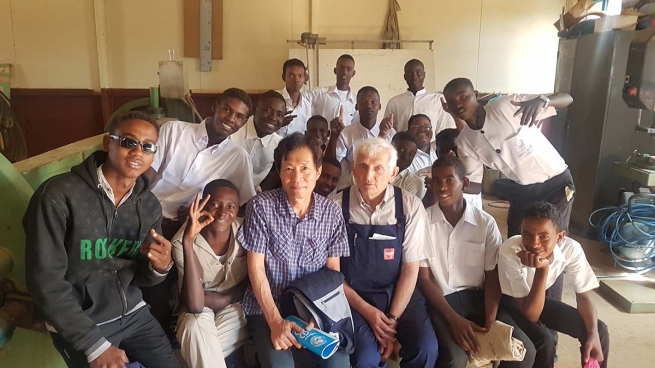SUDAN: Salesian graduates from Don Bosco Center in Seoul, Korea initiate projects to help Salesian vocational centers in Khartoum and El Obedid

(MissionNewswire) The Don Bosco Technical School in El Obedid and the St. Joseph’s Vocational Training Center in Khartoum, Sudan, have received the support and assistance of graduates from the Don Bosco Center in Seoul, Korea. Lin Chanwoo, one of the graduates, and Salesian Brother, Marino Bois, spent seven weeks in Sudan at the Salesian training centers repairing machines and helping teachers find an easier way to make tools.
Together Chanwoo and Br. Bois opened a classroom at the St. Joseph’s Vocational Training Center sponsored by the graduates of the Seoul Don Bosco Center. The new classroom features 15 computers that will be used to teach CAD (computer-aided design). Brother Bois also gave lessons to the teachers to prepare them to teach classes.
Another classroom with 20 computers was opened, sponsored by a woman from Korea, and will be used to teach students how to use a keyboard to type in English and Arabic as well as learn the basic functions of the most commonly used computer programs. Brother Bois says, “What a joy it was to see all the computers turned on together.”
The support offered by Salesian graduates from Korea has grown each year. Last year, Salesian missionaries were provided two new lathes which were the first new machines the schools have had access to. Founded by Salesian Father Vincenzo Donati and brothers, Jim and Andrew Coming, the schools have lacked funding to purchase anything but second-hand machines which over time, have developed many problems. The Salesian vocational schools appreciate every bit of help from the outside in supporting their educational initiatives.
Brother Bois recalls, “I was at the St. Joseph’s Vocational Training Center in 1991–1992, and then too, the school only had a small budget. We could only buy second-hand machines. After we recruited 20 young people, I taught them for four months, then Jim Comino took my place. In collaboration with Fr. Vincenzo Donati, he developed the school until it was taking in 300 students.”
Brother Bois adds, “They also had a request from the local police to teach the boys from the prison. That very morning, two military trucks arrived at the school full of boys who were willing to learn the skills offered in the special courses prepared for them.”
One of the challenges facing the St. Joseph Vocational Training Center is a lack of qualified teachers. Most of the original teachers received their training at the center and had been recruited from refugee camps in the area that is now South Sudan. When South Sudan declared independence, the majority of teachers wanted to return to their homeland. Recruiting new teachers with the knowledge and experience in teaching practical subjects has been difficult.
A young Salesian missionary from India is currently working in the Sudan to bring the vocational training center back to what it had been, starting with the welding section where almost all the machines are close to unusable.
“We will try to see what we can do since we have still some of our budget left over. If we are called upon again and if it is the will of God, we are ready,” adds Br. Bois.
With more than 46 percent of its population living in poverty, the Sudan is one of the poorest countries in the world, according to UNICEF. Low incomes and food deficiencies are commonplace and ongoing violence and civil unrest exacerbate already harsh conditions. Despite these challenges, more youth are in school today than ever before with school attendance up to 73 percent compared to 68 percent in 2008. There remain, however, some 3.2 million children between the ages of 6 and 16 out of school with the highest rates among nomadic populations, those living in rural areas and in the poorest households.
School enrollment and retention is affected by weak curriculum in Sudanese schools and inadequate educational materials and teacher training (according to UNICEF, more than 40 percent of teachers are untrained). Ongoing conflict and the high cost of education, particularly in rural areas where parents have to pay school fees, also affect enrollment rates.
###
Sources:
ANS Photo (usage permissions and guidelines must be requested from ANS)
ANS – Sudan – “What a joy to see all the computers turned on!”
UNICEF – Sudan




